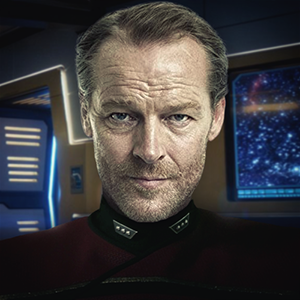The opera’s first act reached its crescendo, the lead soprano’s voice soaring above the orchestral swell as she portrayed the Romulan senator betrayed by her most trusted general. Behind her, holographic projections of ancient warbirds engaged in battle, their destruction rendered in spectacular detail across the domed ceiling of the opera house, before the music ended and the lights dimmed for intermission.
In the state box, Vhiemm rose first, ebullient. ‘A powerful first act, wouldn’t you agree, Captain? Necessary sacrifice in the service of one’s people: a forever potent theme.’
Valance simply nodded. Romulan opera was a little too rife with cultural references and allusions she’d missed to do anything but enjoy the music. ‘An impressive production, Governor.’ She glanced to double-check the presence of her people: Kharth with a sombre expression beside her, Airex a row ahead, already chattering enthusiastically to Doctor Talarin, Thawn behind her – but alone.
‘Where’s Beckett?’ she asked Thawn, voice dropping as the audience stood and shuffled for the doors for refreshment.
‘He mumbled something about “a pressing biological necessity,” and I didn’t ask follow-ups,’ Thawn admitted.
Vhiemm ushered them back into the reception hall, but at once, Valance could feel the shift in atmosphere. Several officials stood in tight clusters, talking in urgent, hushed tones. At once, a slew of the reporters, media drones hovering above them, descended on Brok’tan and Ledera, though Valance couldn’t make out the words in the noise.
‘Something’s happening,’ warned Kharth, brow furrowed.
As if on cue, Beckett slid out of the crowd to join them, his expression one of practiced innocence that immediately raised the hairs on the back of Valance’s neck. ‘Sorry I missed the end -’
Before Valance had to decide whether she’d challenge him, Thawn did, eyes narrowing. ‘You did something.’
‘I…’ He looked like he was considering lying. ‘I just got chatting with some of the local press on my way to the bathroom. We were talking Romulan-Klingon history. Quite fascinating, really.’
‘What did you do?’
Voices rose from the knot around the Klingons.
‘…no idea what you’re talking -’
‘That is outrageous –’
Beckett’s smile was icy. ‘Made everyone aware of the ancestral link between Rencaris and the House of K’Var regarding atrocities committed in this very system in the Klingon-Romulan war of the late-23rd century. And by Rencaris forces in territory that was, back then, K’Var.’
‘This is slander!’ Ledera was snarling at a knot of reporters. ‘House K’Var has no such blood on its hands!’
‘Oh,’ breathed Beckett, self-satisfied as he watched from afar. ‘But you do. And Rencaris has blood on its hands of over a hundred thousand people under the House of K’Var’s protection, deliberately targeted in the retributive strikes.’
Vhiemm had been surrounded by the press, too, and Valance could see him looking tense, frustrated. His body language made it plain he would much rather brush all of this over and return to the opera. But this was out, now. It was the story.
‘What do we do?’ said Kharth. ‘Shall I get Airex?’
‘No,’ Valance said quickly. ‘Let him keep talking with Talarin. That’s a critical angle for tonight. We let this play out.’ But she turned to Beckett, gaze clouded. ‘You should have told me you were going to do this, Lieutenant.’
His mask of innocence didn’t budge. ‘I was talking history, Captain.’
‘Then you and I will talk more history after tonight. In the meantime… keep up the public faces. Our official line is that we have no official opinion about ancient history between foreign powers.’
It didn’t take long after the Starfleet contingent had split up before Ledera, of course, made a bee-line for Valance.
‘You knew,’ growled the Klingon captain, barely keeping a diplomatic mask intact. ‘Your Federation lap-dog released this information with your blessing!’
Valance raised an eyebrow. Cameras were filming. ‘Lieutenant Beckett is an historian on my staff,’ she said, and it wasn’t strictly a lie. ‘I don’t control my officers talking about their work in such a way. I’m sorry if this is an uncomfortable revelation, Captain.’
‘You’ve done this to undermine us,’ Ledera hissed, stepping too close with her voice too low to be picked up by eavesdroppers. ‘Linked us with an historic atrocity –’
‘If I didn’t want to be linked with historic atrocities, I would simply try to not serve people who committed atrocities in the past. But it looks to me as if you were a victim of an atrocity, too, Captain. I’m sure General Brok’tan has an answer.’
The gong went. Vhiemm looked more than eager to usher everyone back in for the second act. His glance towards the Starfleet contingent was less welcoming this time; he knew the role they’d played in this disruption, and couldn’t thank them for it.
Valance could cope with that. She was less comfortable, though, with the tired, burdened gaze of General Brok’tan.
‘Captain Ledera.’
The second act was, to Beckett’s eyes and ears, much the same as the first: betrayal and secrets, all in a cycle where they were necessary and good, but also tragic and doomed. Perhaps the theme was that they doomed individuals but upheld the state? This was a level of Romulan political culture about which he was not an expert, from the exact wrong era of history for him.
That was fine. He was now playing in a better era of history. One where he did know what he was talking about.
Perhaps Brok’tan had given Ledera orders to steer clear of anyone, but as the crowd came back out into the reception hall, she was lingering near the doors. Brok’tan stood amidst journalists, fielding questions, having used the last hour of the performance to presumably rally and consider his message, his response. Beckett could barely hear him, but he caught the key phrases: comments about a shared future, and how the past did not have to define them.
All very good. All very fair. And entirely too productive for Beckett’s purposes.
Ledera looked at him with a curled lip, and had they been somewhere less public, he might have worried. She would probably gut him without hesitation. ‘It’s you,’ she growled. ‘The historian.’
‘I don’t think you’re stupid enough to believe I’m just an historian,’ said Beckett, and was rewarded with a flicker in her gaze to suggest that, actually, she had believed that. It suited her, he thought, to think of him as a soft intellectual who had come up with dusty, unhelpful lies. ‘But I didn’t do this to hurt your people.’
Ledera scoffed. ‘You did this to drive a wedge -’
‘General Brok’tan is fixing things as we speak.’ Beckett waved a hand towards the knot of journalists around the aged Klingon. ‘I wanted to share a point of interest I had about the past with the people of Rencaris and, yes, I thought I could disrupt proceedings between you and them. But it looks like it wasn’t enough.’
‘We are… more determined than that.’ She had no idea what he was driving at.
‘You are. I’m impressed.’ Beckett nodded. ‘You’re not held back by blood spilt a hundred years ago. Even the blood of thousands your house was duty-bound to protect. Who doesn’t have some sort of skeleton in the closet like that, after all? I expect nobody even remembers it.’
Ledera made a face. ‘There are songs still sung of that day. Of the blood shed on Q’alah. It is considered, in K’Var, a day of utmost failure and shame. Of our enemies, and of us, in protecting them.’
‘I didn’t know that,’ Beckett lied softly. ‘That makes General Brok’tan’s response here all the more impressive.’
‘He… is our leader.’
‘But he’s so effortlessly deflecting it. You should listen to him in front of the press. It’s water off a duck’s back to him. Historic wrongs, blood feuds between your house and Rencaris – nothing matters so much as getting this treaty done. Whatever the cost.’ Beckett gave a soft, impressed laugh. ‘If I didn’t know better, I’d guess he knew about this already.’
Was that too much? he wondered as he left Ledera, heading back to the cluster of Starfleet officers. But his profile of Ledera did not include thinking her either very subtle or very clever, and the best lies were the ones people were already predisposed to believing.
Thawn caught his arm at the periphery of the crowd. The gong would go soon. ‘The captain’s pissed,’ she warned him.
‘I’m sure.’ Beckett sighed. ‘She wouldn’t have signed off on this. But it’s going to work, Rosara.’ He looked at her. ‘I told you I’d do this.’
Her gaze was more cautious – more worried. He’d done this, set this in motion, and she hadn’t seen it coming. Her grip on his arm tightened. ‘I hope you know what you’re doing.’
‘I know what I’m doing.’ Normally, that was bravado. This time, he was starting to suspect he was right.
Ledera was stewing, though. He could see the muscle working in the corner of her jaw, and the moment she rejoined Brok’tan on the way back to the theatre, she was talking to him, shoulders hunched, gaze intense. His body language was sharper, sweeping her away, gesturing her off. And still she tried, again and again.
The final act of the opera might have changed in tone. Perhaps it had something to say on the nature of betrayal, the cost of secrecy. Beckett’s eyes were not on the stage, though; not on the lead soprano with her stirring voice, or the production’s impressive use of holograms to give the stage show depth and drama. He looked to the next box over, as Brok’tan tried to watch and Ledera continued to lean in to him. And talk. And talk.
Had he pushed too hard? Too little? Just –
‘Because I am not a dog who has forgotten our fallen!’
Even amidst the swell of the orchestra, the thunderous bellow of Ledera echoed around the theatre as the Klingon warrior shot to her feet, looming over her superior. Brok’tan was looking up, glowering with fury but trying to get her to sit down, calm down, shut up –
‘And you would rather dishonour those who were slaughtered by these dogs for petty politics -’
The opera didn’t come to a sudden halt, but a Klingon standing and yelling in the middle of the theatre was enough to, eventually, silence the singer, silence the orchestra. The lights of the show kept flashing, carrying on with events no longer pouring out through body and song. Some staffer, perhaps misunderstanding the cue, changed the auditorium lighting as if the final performance had finished, turning eyes away from the stage and towards what had become a towering fight between Klingons.
One show was over. The next had just begun.

 Bravo Fleet
Bravo Fleet








